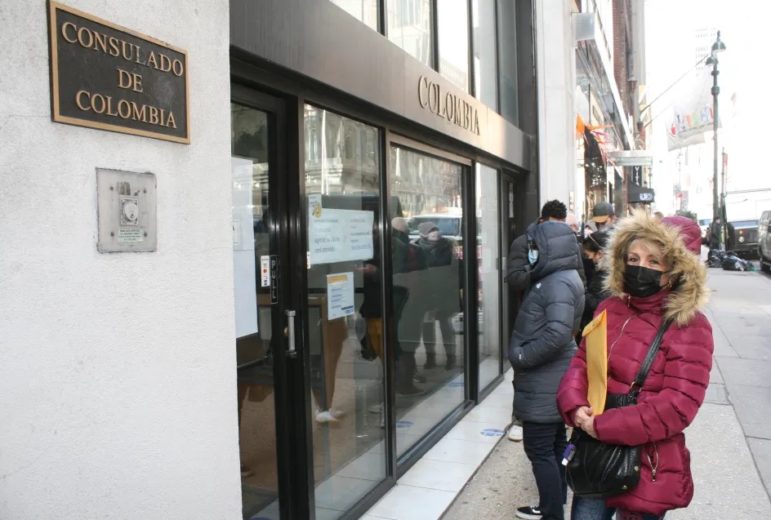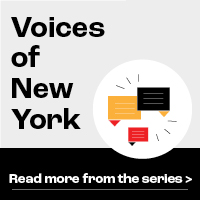
Fernando Martínez/El Diario/Impremedia
The worst “crises” have arisen at the Ecuadoran, Mexican, Colombian and Dominican consulates.This story was reported and originally published by El Diario on March 20, 2021. It was translated by Carlos Rodriguez.
A year into the pandemic, routine consular operations such as passport renewals and notary services have hardly returned to normal for thousands of Latin American immigrants living in New York City. The delays caused by the months-long closure of consulates and embassies, social distancing rules and appointments moving online have caused a bottleneck that many have experienced as a “maze” that can take months to resolve.
Mexican, Dominican, Ecuadoran and Colombian residents, representing the largest Latino communities in the city, share a daily “agony” at the doors of their respective diplomatic sites. Appointments to pick up, renew or apply for passports often require wait times of many months. To top it off, assistance by phone is lacking.
Ecuadoran immigrant Juliana Vera, 52, said that she visited her country’s consulate in Long Island City to try to renew in person the only identification document she can present while traveling, a problem that she would rather not address online. The earliest appointment the automated system offered her is in April 2022.
“No one picks up the phone. It is absurd to think that I can’t even plan to visit my family for the holidays. I understand that COVID-19 has complicated things for everyone, but I think they need to find a way to expedite these processes. In my case it is for travel, but for many of my people it is a matter of life and death. It gets worse when you add delicate issues such as immigration,” she said.
Hers is only one of many complaints expressed on the consulate’s Facebook page on a daily basis, which commonly focus on the current restrictions that mean obtaining a passport at the Manhattan and Queens Ecuadoran consulates can take up to 12 months.
In the midst of the avalanche of criticism, Carlos Martínez, Consul General of Ecuador in New York, admitted to El Diario that “unfortunately” there clearly is a delay in consulate services, but added that this should be understood in the context that “the pandemic is still happening.”
“We face occupancy limitations in our offices. We cannot welcome the same number of Ecuadorans we normally serve. Worse yet, while the demand for passports is extremely high, our capacity is diminished,” he said.
Martínez said that there is evidently a delay problem and that he is aware that it deeply affects the lives of his compatriots. Still, he added, in the last few weeks some measures have been taken to speed up processing, particularly for emergency cases.
“Two weeks ago, we launched a plan to reschedule appointments, and so far we have been able to process at least 800 applications. Between 25 and 30 passports have been issued per day for special situations, such as that of the beneficiaries of the Deferred Action for Childhood Arrivals (DACA,) who need it to renew their work permits,” he said.
The representative of the Ecuadoran consulate estimated that, with its New York City offices now operating under extended hours – until 7:00 p.m. – the congestion caused by pandemic safety measures should begin to ease.
Regarding the recurring complaints about the consulate’s phone assistance’s low response rate, Martínez said that the volume of calls is enormous, and encouraged Ecuadorans in New York seeking specific information to find the appropriate numbers to call for each type of service on the consulate’s website.
“We are sorry about the long wait times. In many cases, our compatriots call the consulate’s main phone lines, when most of our associates are personally serving other Ecuadorans. In that case, callers need to make sure to call the specific numbers we have published,” said Martínez.
Mexicans are also complaining
This week, a family matter required Mexican student Pamela Rodríguez to travel to her country immediately. However, when she signed into the consulate’s appointment system to obtain her identification document, the earliest date she could get was the last week of May.
Rodríguez went to the Mexican consulate in Manhattan in person, and left with good news. “I was able to solve it because it was an emergency. The service was frankly good, but it requires time and patience,” she said.
The experience of “José,” 45, a construction worker born in Puebla who lives in Brooklyn, was the opposite. He has spent a month trying to get an appointment to obtain his passport, to no avail.
“Opening an email and searching on the computer is not easy for everyone. If you come to the consulate without having done something in advance online, you do not get the best service. I waited 20 years to be able to regularize my status in this country, and now that I want to return to my town, it is my own country’s complicated paperwork that is stopping me,” said the worker, who chose to remain anonymous.
The Mexican consulate has shared a series of videos on their website to show users how to access their Mexitel online appointment system. In addition, to prevent overcrowding at their offices, they created Consulates on Wheels, a campaign that brings their services to locations across the tristate area with a high concentration of Mexican residents.
The services offered include issuing passports, consular licenses, voter credentials (INE) and birth certificates. There are currently over 60 such sites, located in boroughs outside Manhattan.
In response to complaints of inefficient service, New York Consul General of Mexico Jorge Islas has said in a series of Facebook Live sessions that he has always insisted on and demanded his staff to provide “empathetic treatment” to their compatriots.
“What’s more, I invite all Mexicans to email me directly at jilsasl@sre.gob.mx whenever you are provided poor service or mistreated at any of our offices. If we find it is a clear case, we will take swift action,” he said.
Colombians wait in line
Not even bad weather was able to reduce the number of people who stood in front of the Colombian consulate in New York. Hundreds of Colombians queue up every day on 46th Street at Sixth Avenue in Manhattan, not always patiently.
Elizabeth Cifuentes said that she began paperwork for a service at the consulate a month ago. The long wait caused her Colombian documents to expire, which unleashed a series of additional issues.
“Even if you do make your appointments, there are always problems because the system is clogged up and everything moves very slowly. I understand it is because of the pandemic, but I think there should be other ways to do things. One ends up missing doctor’s appointments and wastes weeks trying to solve anything. That said, the staff is very courteous,” she said.
Miguel Cáceres, a young man from Bucaramanga, said that he was trying to change his appointment to a New Jersey office, where his passport renewal process might be faster, because he needs to travel urgently. However, he has only found obstacles in his path.
“The other issue is that I am sure this is the consulate with the most holidays and days off. During the recent blizzards, they closed the offices for four whole days, which is understandable, but they did not operate at all. The answer is always ‘I apologize. It’s because of the pandemic,’” said Cáceres.
Susana Berenguer, Consul of Colombia in New York, has been expressing on social media since November that “this is a new way to serve the public in the midst of the pandemic. We are all learning.”
On their website, nuevayork.consuladogov.co, they have activated new resources such as video tutorials, an online chat, special hotlines and constant updates to allow the Colombian community to “navigate” the new ways in which they can access services.
Dominicans also face delays
It is normal to see long queues of people standing outside the Consulate of the Dominican Republic in Times Square in Manhattan waiting to obtain services. Many say that the situation has become “disastrous” due to the hours-long waits, even with an appointment. People often become frustrated and voice out their complaints, directed at the staff.
Recently, Marilyn Espinal said that when she requested an appointment to renew her identification document three weeks ago, the system did not specify which other documents she would need to do so.
“I arrive at 9 a.m., and at 11 I find out that I was supposed to bring my birth certificate and my identity card. There are elderly people standing out here in the cold for hours every day, only to go back home empty-handed. This service needs to improve,” said Espinal.
For her part, Cibao native Margarita Alonso said that the phone numbers posted by the consulate to ask questions are “only for decoration.”
“They never pick up. You spend hours waiting here on the street in this weather. And then, when you finally make it into the office, they send you back home because you don’t have a little paper no one told you needed to bring,” said Alonso.
A staff member at the consulate, who chose to remain anonymous, said that the office is making a “superhuman” effort to provide services to the largest Latino community in New York, adding that facilities are being expanded “every month” to make the public more comfortable.
“Unfortunately, it is often hard for people to follow the rules even though they are clear. No one can say that we are not trying to solve the problems of every Dominican. The appointments system sometimes gets blocked. We live in a world that is dealing with a health crisis,” said the source.










2 thoughts on “Pandemic Delays for Consular Services Upend Immigrants’ Lives”
This is a powerful piece detailing the inordinate obstacles and delays facing the Latinx community in obtaining passport renewals and other documents needed to travel to their countries of origin, even in emergency situations. The migration to on-line application and services unequally affects these communities and not enough is being done to address these obstacles and delays. The Mexican Consulate’s Consulate on Wheels going directly into communities is a good idea that should be expanded. These Consulates need to get creative in how they deliver services rather than give the excuse of “the Pandemic”. Terrific article using the very personal experiences and predicaments of those caught in the logistical maze.
Do I have to make an appointment for the Consulate on Wheels? They will be in my area fairly soon and can’t seem to make any appointment through Mexitel or through their online appointment system. Seems like NY isn’t even on their radar. Please Help!